What Essential Oils Get Rid of Ants
Are you tired of dealing with ants invading your home?
We will explore why ants are a problem and what attracts them to your home. Additionally, we will discuss the effectiveness of essential oils in getting rid of ants and the benefits of using them for roach control.
From peppermint oil to lavender oil, we will break down which essential oils are most effective against ants and how to use them. We will cover other natural ways to eliminate ants and address safety concerns regarding essential oils for pets and children.
Stay tuned to learn how to keep your home ant-free using natural remedies!
Key Takeaways:
Why Are Ants a Problem?
Ants can become a nuisance in households, especially when they form large colonies and invade living spaces searching for food sources. The use of toxic chemical repellents like Raid may pose risks to human health and the environment, prompting the exploration of natural and organic solutions.
Using chemical repellents can lead to harmful consequences for the ecosystem as well. The toxins in these products can contaminate water sources, harm beneficial insects, and even lead to pesticide resistance in ants over time. When these chemicals are applied indoors, they can linger in the air, putting the health of your family members at risk.
It’s essential to consider the broader impact of pest control methods and opt for organic alternatives. Solutions such as diatomaceous earth, vinegar, or essential oils like peppermint and tea tree can effectively deter ants without endangering your health or the environment.
What Attracts Ants to Your Home?
Ants are often attracted to homes by the presence of fallen food items, open entry points, and unsanitary conditions that provide easy access to food sources and nesting areas.
One of the primary factors that draw ants inside houses is the smell of food leftovers that are left out in the open, inviting these tiny creatures to feast upon them. Cracks in walls, gaps in door frames, and unsealed windows offer convenient pathways for ants to enter homes in search of food and water.
Proper sanitation plays a crucial role in keeping ants at bay as eliminating spills, crumbs, and standing water removes their attraction to the household environment. Taking steps to seal off potential entry points can significantly reduce the chances of ant infestations, creating a deterrent against their invasion.
What Are Essential Oils?
Essential oils are natural compounds extracted from plants that carry potent aromas and various beneficial properties. These oils are commonly used for their aromatic qualities and have been found effective in repelling pests due to their unpleasant scents for insects.
Derived from leaves, flowers, roots, and other parts of plants, essential oils are extracted through processes like steam distillation or cold pressing. Each oil boasts a unique chemical composition that gives it a distinct fragrance and potential health benefits. For instance, lavender oil is well-known for its calming properties, while citronella oil is a popular choice for its insect-repellent qualities. When used in natural pest control methods, these oils disrupt the senses of pests, making the environment inhospitable for them. Incorporating essential oils in pest control not only helps in keeping insects at bay but also offers a more environmentally friendly alternative to harsh chemical pesticides.
How Do Essential Oils Get Rid of Ants?
Essential oils act as natural repellents for ants by disrupting their communication and rummaging patterns, creating an environment with unpleasant scents that deter ants from infesting living spaces.
When ants detect the scent of certain essential oils, such as peppermint, citrus, or tea tree oil, it triggers a response that disrupts their pheromone trails, making it difficult for them to find food sources or communicate with the colony effectively. This interference in their chemical signals can significantly hinder ant foraging, ultimately reducing their population’s impact on your home.
What Are the Benefits of Using Essential Oils for Ant Control?
Utilizing essential oils for ant control offers a natural, non-toxic alternative that is safe for the environment, pets, and human health. These oils can effectively manage infestations while providing a pleasant aroma and uplifting environment.
One of the key advantages of incorporating essential oils in ant control is their ability to deter ants without the use of harmful chemicals. This makes them a preferred option for households looking to eradicate pests in an eco-friendly manner.
The natural properties of essential oils not only repel ants but also disrupt their communication and foraging patterns, ultimately reducing the likelihood of reinfestation. These oils are versatile and can be used in various forms, such as sprays, diffusers, or even in DIY ant traps.
What Essential Oils are Effective Against Ants?
Several essential oils have shown efficacy in repelling ants, including peppermint, tea tree, lemon, eucalyptus, and lavender oils, due to their bioactivity and repellent properties.
Among these, peppermint oil is known for its high concentration of menthol, which disrupts ants’ senses and interferes with their ability to navigate, making it difficult for them to locate food sources.
Tea tree oil, on the other hand, contains terpenes that have insecticidal properties, effectively deterring ants from entering spaces where it is applied.
Lemon essential oil is rich in limonene, a compound that disrupts ants’ pheromone trails, causing confusion and preventing them from forming organized foraging paths.
Peppermint Oil
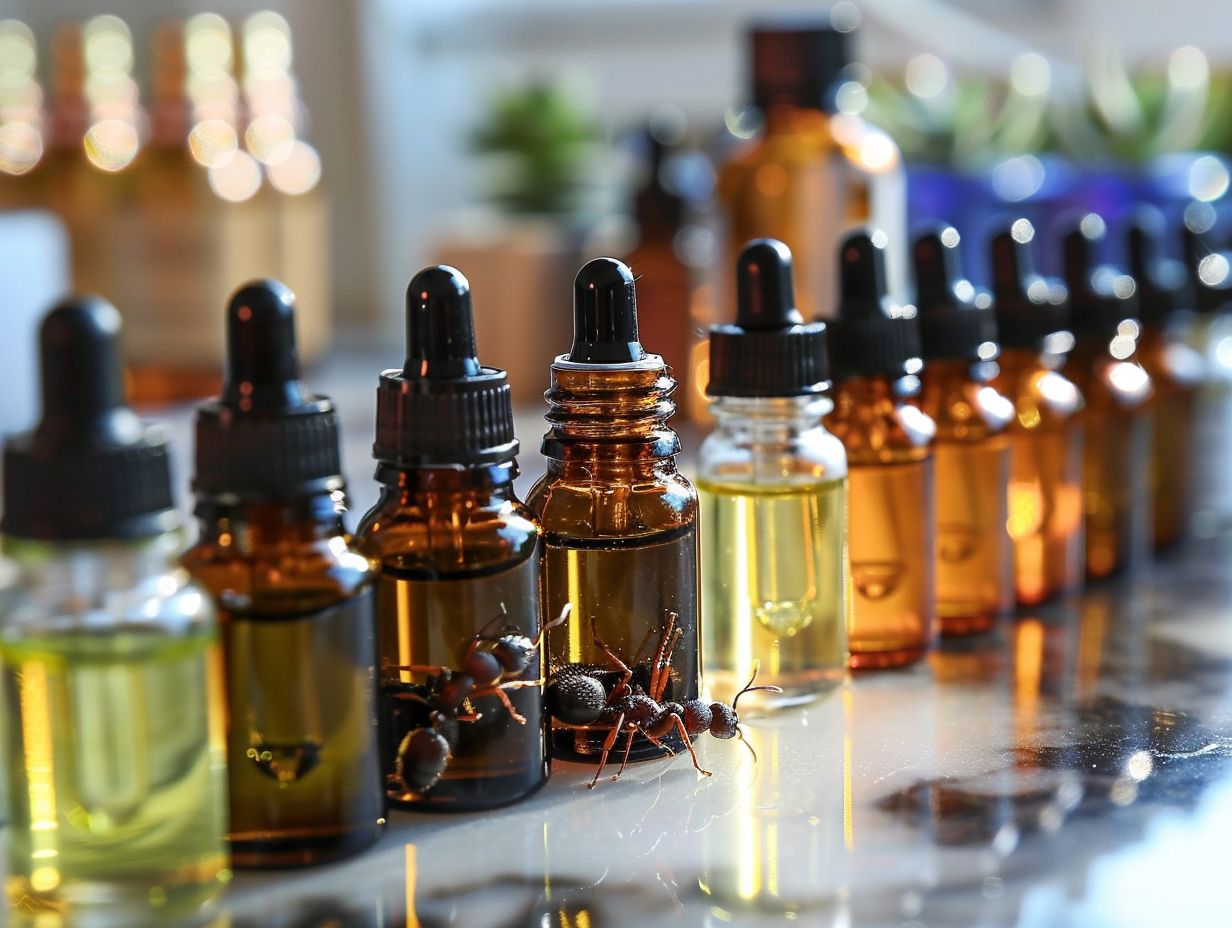
The refreshing aroma of peppermint oil not only repels ants but also leaves your home smelling fresh and clean, without the harsh chemical odors often associated with ant repellents.
Compared to citrus-based repellents, peppermint oil lasts longer and provides a more potent barrier against ants, ensuring that these pesky insects stay away from your living spaces.
The non-toxic nature of peppermint oil makes it a safer choice for households with pets, as it poses minimal risk to furry companions compared to chemical insecticides.
Tea Tree Oil
Tea tree oil is a natural ant repellent known for its antimicrobial properties and potent scent that deters ants from invading spaces, offering a non-toxic solution for pest control.
Unlike chemical insecticides that can harm pets or contaminate food, tea tree oil provides a safe alternative for households. Its effectiveness lies in disrupting the ants’ pheromone trails, causing confusion and deterring them effectively. When diluted with water, tea tree oil can be sprayed along windowsills, doorways, or other entry points to create a barrier that repels ants organically. This eco-friendly approach not only protects your home but also contributes to a healthier environment without the use of harsh chemicals. The versatile nature of tea tree oil makes it a popular choice for various other natural remedies and skincare products.
Lemon Oil
Lemon oil serves as a natural ant repellent due to its citrusy aroma that disrupts ant communication and foraging patterns, acting as a safe and eco-friendly alternative to toxic chemicals.
This non-toxic solution not only deters ants from invading living spaces but also has a lasting impact on their behavior. The powerful scent of lemon oil overwhelms the pheromone trails that ants use to navigate, causing confusion and disorientation among them.
As ants rely heavily on their sense of smell for communication and orientation, the presence of lemon oil disrupts their ability to locate food sources, leading them to avoid areas treated with this natural repellent.
Eucalyptus Oil
Eucalyptus oil acts as a natural ant repellent with its strong aroma that deters ants while offering a safer alternative to toxic chemical sprays, making it an effective choice for pest control.
Derived from the leaves of eucalyptus trees, this essential oil contains compounds that are known for their insect-repelling characteristics.
Ants find the scent overpowering, disrupting their trail pheromones and deterring them from entering homes or marching in lines across surfaces.
By simply diluting a few drops of eucalyptus oil with water in a spray bottle, you can create a potent yet eco-friendly solution to keep ants at bay.
Lavender Oil
Lavender oil functions as a natural ant repellent, emitting a soothing aroma that deters ants while offering a non-toxic solution for pest control, making it a preferred choice for maintaining a pest-free environment.
The calming scent of lavender oil not only keeps ants at bay but also adds a pleasant aroma to your surroundings, creating a serene and relaxing atmosphere. This essential oil is known for its effectiveness in repelling insects without the use of harmful chemicals, making it safe for use around children and pets. Incorporating lavender oil into your pest management routine can help deter ants from entering your home, providing a natural and eco-friendly alternative to traditional insecticides.
How to Use Essential Oils for Ant Control?
There are various methods to use essential oils for ant control, including direct application, homemade repellent sprays, and essential oil-soaked cotton balls that offer safe and effective solutions without toxic chemicals.
When applying essential oils directly, it’s important to dilute them with a carrier oil like coconut or olive oil to avoid skin irritation. For homemade repellent sprays, mix a few drops of peppermint oil with water in a spray bottle and mist around entry points. Another creative method is soaking cotton balls in lemongrass oil and placing them where ants are commonly seen, as the strong scent deters them effectively. The aromatic properties of essential oils not only repel ants but also leave your home smelling fresh and natural.
Direct Application
Directly applying essential oils in areas frequented by ants can deter their presence, as the oils release scents that repel the insects without the need for toxic sprays or chemicals.
When targeting ant-infested zones, one can apply a few drops of peppermint, tea tree, or citrus oils along their trails or entry points, disrupting their communication and foraging patterns.
Aside from being effective, this method is eco-friendly and safe for pets and children, making it an ideal alternative to harsh pesticides. The pleasant aroma of these oils can also freshen up the surroundings.
Homemade Ant Repellent Spray
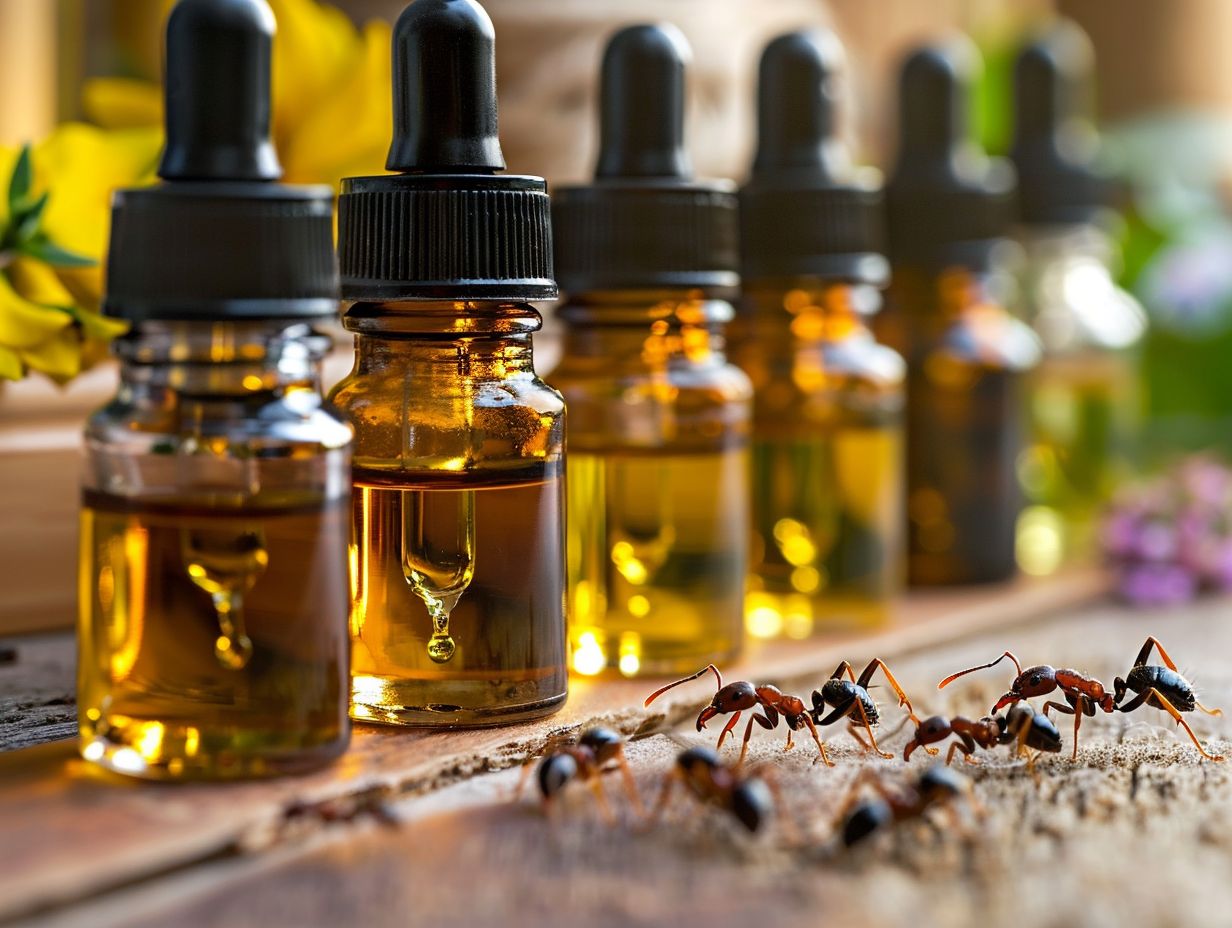
These natural oils are known for their strong scents that ants find repulsive, disrupting their communication and foraging trails.
Combining essential oils with water in a spray bottle creates a potent and eco-friendly ant repellent that can be used both indoors and outdoors.
Simply spray the mixture in areas where ants frequent, such as entry points, windowsills, and along baseboards, to create a barrier that deters them from entering your living spaces.
Regular reapplication may be necessary as the scent dissipates over time, but the effectiveness of these homemade solutions makes them a popular choice for those seeking natural pest control methods.
Essential Oil Soaked Cotton Balls
Placing essential oil-soaked cotton balls in areas where ants are prevalent can serve as an effective and pet-friendly method to deter ants naturally and maintain a pest-free environment without toxic chemicals.
Ants detest the potent aroma of essential oils, making them an excellent deterrent without harming pets or children in the household. The convenience of using cotton balls soaked in essential oils lies in their versatility; they can be placed in cabinets, along ant trails, or under sinks to discourage ant infestation.
The non-toxic nature of essential oils ensures that there are no harmful residues left behind, making them safer for the environment and your family. This natural approach not only repels ants effectively but also adds a pleasant fragrance to your living spaces.
Are Essential Oils Safe for Pets and Children?
Essential oils can be safe for pets and children when used appropriately and in diluted forms, offering a natural and non-toxic alternative to chemical repellents that pose risks to both human health and the environment.
It’s crucial to understand that not all essential oils are safe for pets. Certain oils, such as tea tree, pennyroyal, and wintergreen, can be toxic to cats and dogs if ingested or inhaled in high concentrations. It’s essential to dilute essential oils properly before using them around pets and children. This can be achieved by mixing a few drops of the essential oil with a carrier oil, such as coconut or almond oil, to reduce their potency. Always make sure to store essential oils out of reach of children to prevent accidental ingestion. Investing in a quality diffuser can also help diffuse the oils safely throughout a room without direct contact.
Other Natural Ways to Get Rid of Ants
Along with essential oils, there are other natural methods to eliminate ants, such as using vinegar, cinnamon, citrus peels, and borax, which offer non-toxic alternatives to chemical repellents. “
These household items are readily available and easy to use for ant control.
- Vinegar: Its strong scent disrupts ants’ pheromone trails, making them lose their way.
- Cinnamon: Ants have an aversion to the strong smell of cinnamon, deterring them from entering your home.
- Citrus peels: Citrus scents act as a natural repellent, keeping ants away from your kitchen or garden.
- Borax: When combined with sugar, borax can effectively eliminate entire ant colonies.
Try incorporating these natural solutions into your ant management routine for a safer and eco-friendly approach.
Vinegar
Vinegar acts as a natural ant repellent due to its strong scent that disrupts ant trails and communication, offering an eco-friendly alternative to toxic chemical sprays.
When ants detect the aroma of vinegar, it confuses their tracking abilities, preventing them from finding food sources or entering your living spaces. By interrupting the pheromone trails that ants use to communicate, vinegar disrupts their organized foraging and nesting patterns, ultimately deterring them from setting up camp in your home.
Another benefit of using vinegar as an ant repellent is its non-toxic nature. Unlike harsh chemicals that can pose risks to pets, children, and the environment, vinegar provides a safe and effective way to manage ant invasions without introducing harmful substances into your living environment.
Cinnamon
Cinnamon serves as a natural ant repellent with its strong aroma that deters ants and disrupts their communication, offering a safe and effective alternative to toxic chemical sprays.
Ants are repelled by the scent of cinnamon due to its potent compounds like cinnamaldehyde, which interfere with their ability to navigate and locate food sources. This natural approach is not only eco-friendly but also fragrance-filled, making your home smell delightful. The use of cinnamon as a repellent aligns with a sustainable lifestyle, avoiding the harsh impact of harmful chemicals on the environment.
In addition, cinnamon has been known for its antimicrobial properties, contributing to a healthier indoor environment free from unwanted pests. Consider incorporating cinnamon sticks or essential oil in your ant control routine to reap these benefits.
Citrus Peels
Citrus peels can act as natural ant repellents due to their citrusy scent that ants find displeasing, providing an eco-friendly solution to pest control without toxic chemicals.
Ants rely heavily on pheromones to communicate and navigate, making the overpowering citrus aroma from citrus peels a disruptor to their trails, confusing and repelling them from entering your living spaces.
Not only do citrus peels serve as a deterrent, but they also add a pleasant fragrance to your home, making it a double win situation.
Borax
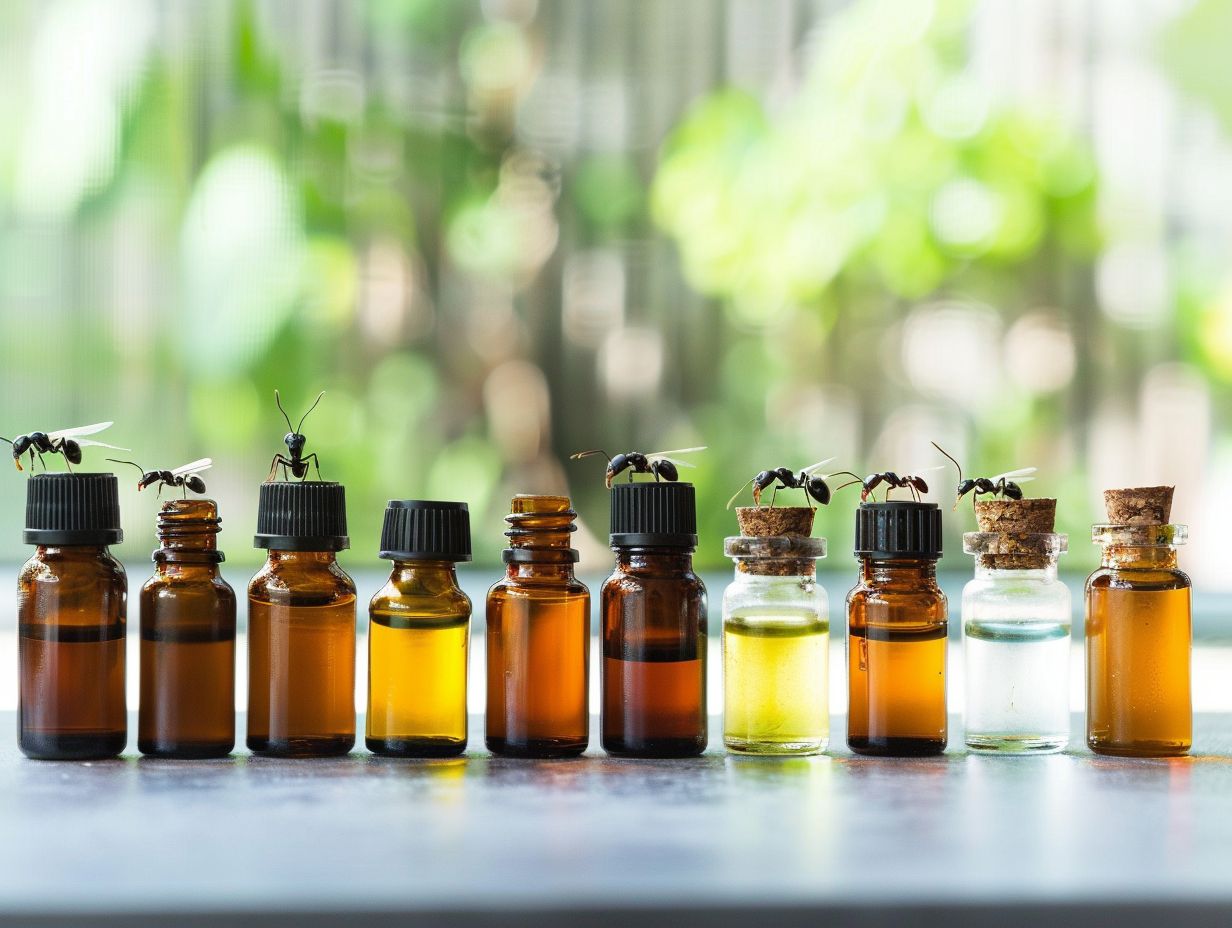
When ants come into contact with borax, it interferes with their digestive enzymes, ultimately causing them to starve and die. This natural mineral acts as a slow-acting poison, allowing the worker ants to carry it back to their colonies, effectively spreading the bait to the entire population. It is important to mix the borax with a sweet substance like sugar to attract the ants to the bait. Placing these bait stations near ant trails or entry points can enhance the effectiveness of the treatment.
Frequently Asked Questions
What essential oils are best for getting rid of ants?
The most effective essential oils for repelling ants are peppermint, tea tree, lemon, eucalyptus, clove, and cedarwood.
How do I use essential oils to get rid of ants?
You can dilute a few drops of the chosen essential oil in water and spray it directly on ant trails or areas where they enter your home. You can also add a few drops to a damp cloth and wipe down surfaces.
Do essential oils kill ants?
Some essential oils, such as peppermint and tea tree, can have insecticidal properties and may kill ants upon contact. However, the main purpose of using essential oils is to repel ants and prevent them from entering your home.
What is the most effective way to use essential oils for ant control?
The best way to use essential oils for ant control is to combine them with other natural methods, such as sealing cracks and crevices, keeping surfaces clean, and using natural ant deterrents like diatomaceous earth.
Are essential oils safe to use around pets and children?
While essential oils are natural, they can still be toxic to pets and children if ingested in large amounts. It is important to always dilute essential oils properly and keep them out of reach of pets and children.
Can I use any type of essential oil to repel ants?
While some essential oils may have ant-repelling properties, it is best to stick with the most effective ones, such as peppermint, tea tree, lemon, eucalyptus, clove, and cedarwood. Other essential oils may not be as effective or safe for use around pets and children.

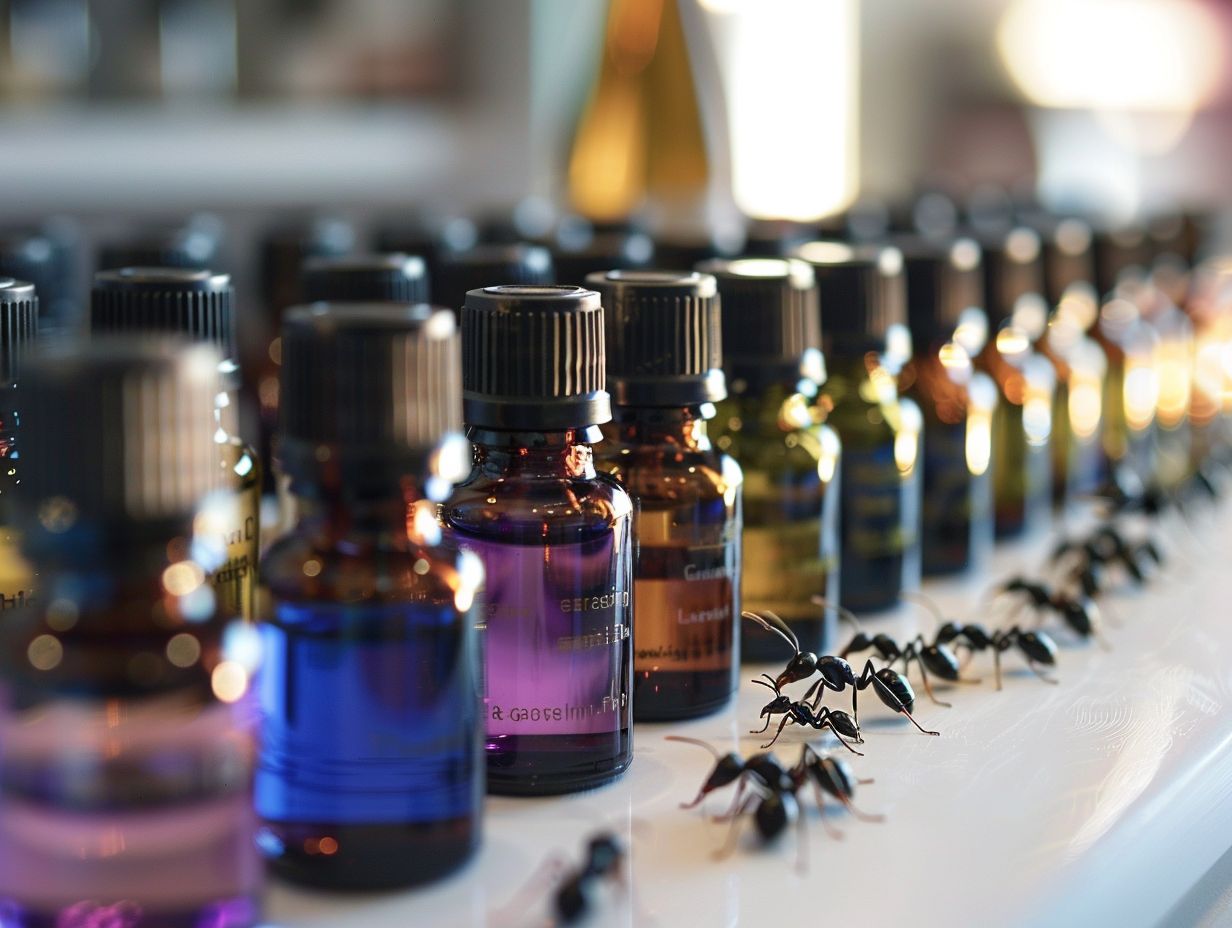




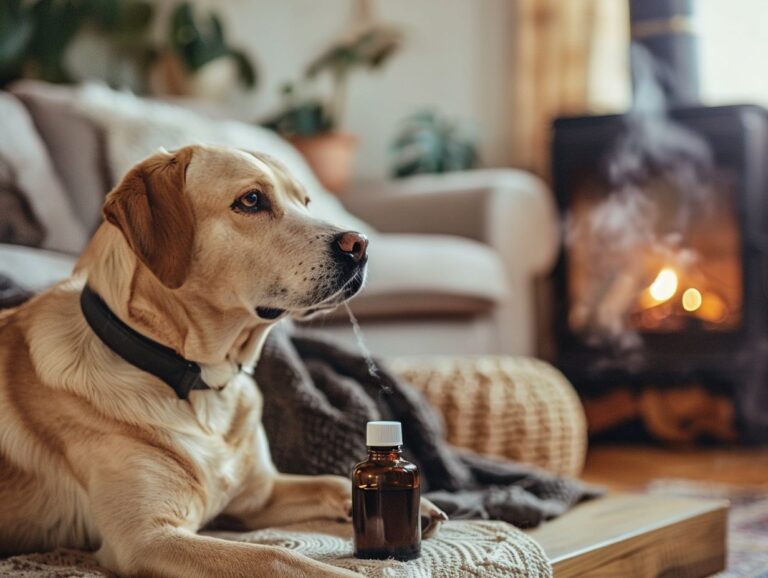

3 Comments